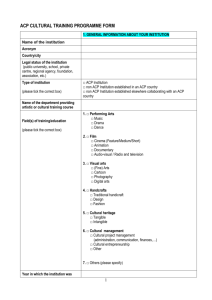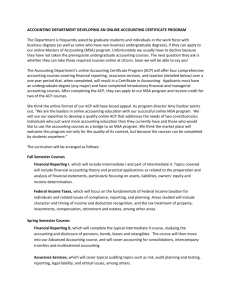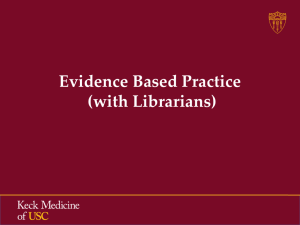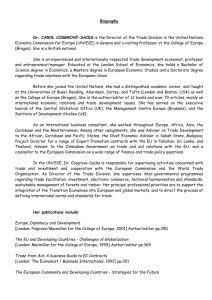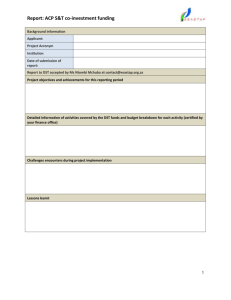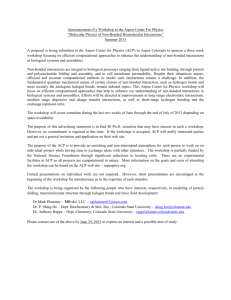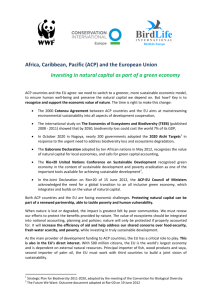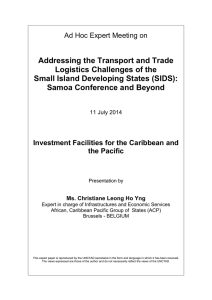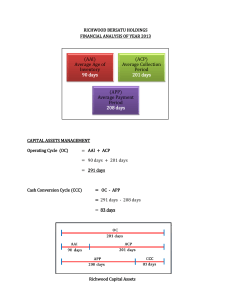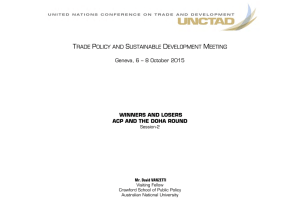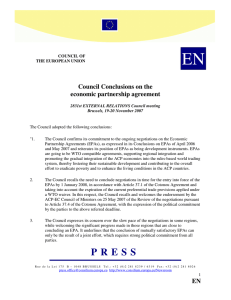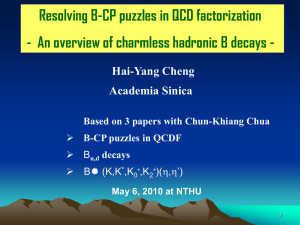santo domingo declaration
advertisement
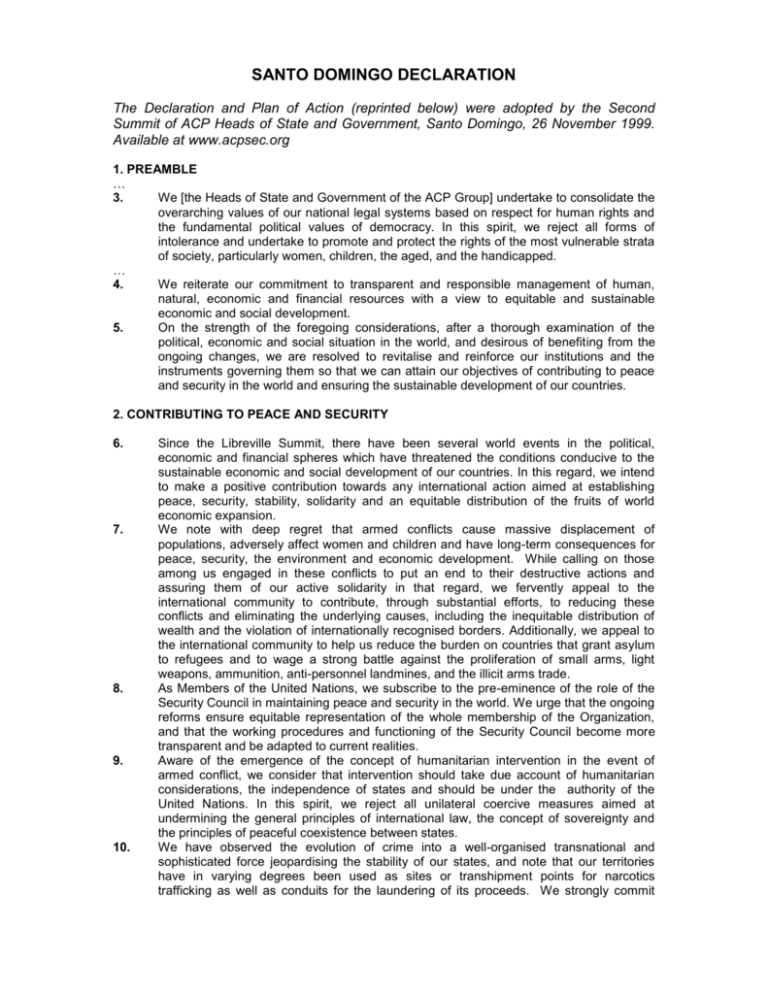
SANTO DOMINGO DECLARATION The Declaration and Plan of Action (reprinted below) were adopted by the Second Summit of ACP Heads of State and Government, Santo Domingo, 26 November 1999. Available at www.acpsec.org 1. PREAMBLE … 3. We [the Heads of State and Government of the ACP Group] undertake to consolidate the overarching values of our national legal systems based on respect for human rights and the fundamental political values of democracy. In this spirit, we reject all forms of intolerance and undertake to promote and protect the rights of the most vulnerable strata of society, particularly women, children, the aged, and the handicapped. … 4. We reiterate our commitment to transparent and responsible management of human, natural, economic and financial resources with a view to equitable and sustainable economic and social development. 5. On the strength of the foregoing considerations, after a thorough examination of the political, economic and social situation in the world, and desirous of benefiting from the ongoing changes, we are resolved to revitalise and reinforce our institutions and the instruments governing them so that we can attain our objectives of contributing to peace and security in the world and ensuring the sustainable development of our countries. 2. CONTRIBUTING TO PEACE AND SECURITY 6. 7. 8. 9. 10. Since the Libreville Summit, there have been several world events in the political, economic and financial spheres which have threatened the conditions conducive to the sustainable economic and social development of our countries. In this regard, we intend to make a positive contribution towards any international action aimed at establishing peace, security, stability, solidarity and an equitable distribution of the fruits of world economic expansion. We note with deep regret that armed conflicts cause massive displacement of populations, adversely affect women and children and have long-term consequences for peace, security, the environment and economic development. While calling on those among us engaged in these conflicts to put an end to their destructive actions and assuring them of our active solidarity in that regard, we fervently appeal to the international community to contribute, through substantial efforts, to reducing these conflicts and eliminating the underlying causes, including the inequitable distribution of wealth and the violation of internationally recognised borders. Additionally, we appeal to the international community to help us reduce the burden on countries that grant asylum to refugees and to wage a strong battle against the proliferation of small arms, light weapons, ammunition, anti-personnel landmines, and the illicit arms trade. As Members of the United Nations, we subscribe to the pre-eminence of the role of the Security Council in maintaining peace and security in the world. We urge that the ongoing reforms ensure equitable representation of the whole membership of the Organization, and that the working procedures and functioning of the Security Council become more transparent and be adapted to current realities. Aware of the emergence of the concept of humanitarian intervention in the event of armed conflict, we consider that intervention should take due account of humanitarian considerations, the independence of states and should be under the authority of the United Nations. In this spirit, we reject all unilateral coercive measures aimed at undermining the general principles of international law, the concept of sovereignty and the principles of peaceful coexistence between states. We have observed the evolution of crime into a well-organised transnational and sophisticated force jeopardising the stability of our states, and note that our territories have in varying degrees been used as sites or transhipment points for narcotics trafficking as well as conduits for the laundering of its proceeds. We strongly commit ourselves to continue the fight against drug trafficking and money laundering in a well coordinated international effort. 3. UNDERTAKING SUSTAINABLE DEVELOPMENT 11. We strongly hold the view that the realisation of sustainable development, the eradication of poverty, ignorance and disease as well as the gradual and smooth integration of the ACP countries into the global economy are legitimate objectives reflecting the aspirations of our peoples. We declare that people-centred development implies that people must be directly involved in the decision-making process and in the implementation of development plans and programmes. The financial crisis in Asia and the ensuing global economic slowdown have had serious repercussions on the global economy. Our weak economies too have suffered from the adverse effects of this phenomenon. This situation has compounded the precarious economic predicament of many ACP countries. We therefore appeal for the reinforcement of international economic cooperation and renewed financial flows to the ACP States. We note the ongoing efforts to improve the existing framework for regulating international financial transactions and capital markets, and stress the urgent need for an appropriate monitoring mechanism. A great deal of uncertainty still attaches to the overall economic outlook in the medium term although recent trends suggest a start to recovery. We are of the view that the fight against poverty, ignorance and disease will remain one of the major challenges confronting our states. We therefore need to implement social and economic policies to ensure total economic development and urge the international community to increase the resources for fighting against this scourge. We remain concerned by the crushing burden of debt, the reduction of official development assistance and the weak flow of foreign direct investments to the ACP countries. We consider it indispensable for this alarming trend to be reversed if a solution is to be found to the acute problems posed by the fight against poverty. While welcoming the initiatives recently taken by the World Bank and the International Monetary Fund relating to the new set of measures to alleviate the debt of the HighlyIndebted Poor Countries (HIPC), we consider them not extensive enough to adequately resolve the debt problem of the ACP States. We emphasise the need for the international community to provide more substantial debt relief, speed up the stages of implementation of the HIPC initiative and grant adequate technical assistance to reinforce our povertyalleviation strategies. We recognise the central role of the private sector in the development process and its key role in generating growth, diversification, employment and wealth. We are committed to creating suitable conditions for its enhancement and increasing its involvement, as well as that of the other actors of civil society, in the dialogue concerning the definition of the main orientations of national development policies, including the consolidation of democracy and respect for human rights. In that regard, we reaffirm our will to promote decentralised cooperation. In both the private and public sectors, the enhancement of human resources is an essential need. We are therefore determined to give urgent attention to upgrading our human resources and to building of knowledge capacities especially in the areas of science and technology. We reiterate our commitment to strive for the sustainable management of our natural resources. Consequently, we recall the 1992 Rio Declaration on the Environment and Sustainable Development and note that not much has been done in terms of the implementation of initiatives therefrom to protect vulnerable ACP States from the ravages of climatic change and desertification and thereby prevent further degradation of our biodiversity. We reaffirm the importance of a transparent, fair and equitable rule-based multilateral trading system. In that regard, we acknowledge the WTO’s role in providing a framework for the promotion of trade liberalisation and adoption of trade-related rules. We are aware that trade liberalisation should be pursued progressively by giving adequate support to developing countries, in particular the least developed, landlocked, small and vulnerable and island states. In this regard, we urge that the Declaration to be adopted by the 3rd WTO Conference in Seattle should contain a clear and unequivocal 12. 13. 14. 15. 16. 17. 18. 19. 20. 21. 22. … reaffirmation of special and differential treatment as a fundamental principle of the multilateral trading system and its enhancement as appropriate. We attach extreme importance to the need for the agenda of the 3rd WTO Ministerial Conference and the resultant work programme to give priority to the issues of implementation in the existing agreements and to the development concerns of developing countries. In these and other relevant regards, we recall the declaration adopted by our Ministers of Trade at their second meeting. We emphasise the important role UNCTAD has played and continues to play in development matters, and urgently request that this role be consolidated in future. We encourage the intensification of cooperation between WTO and UNCTAD with a view to strengthening the institutional capacities of developing countries.

